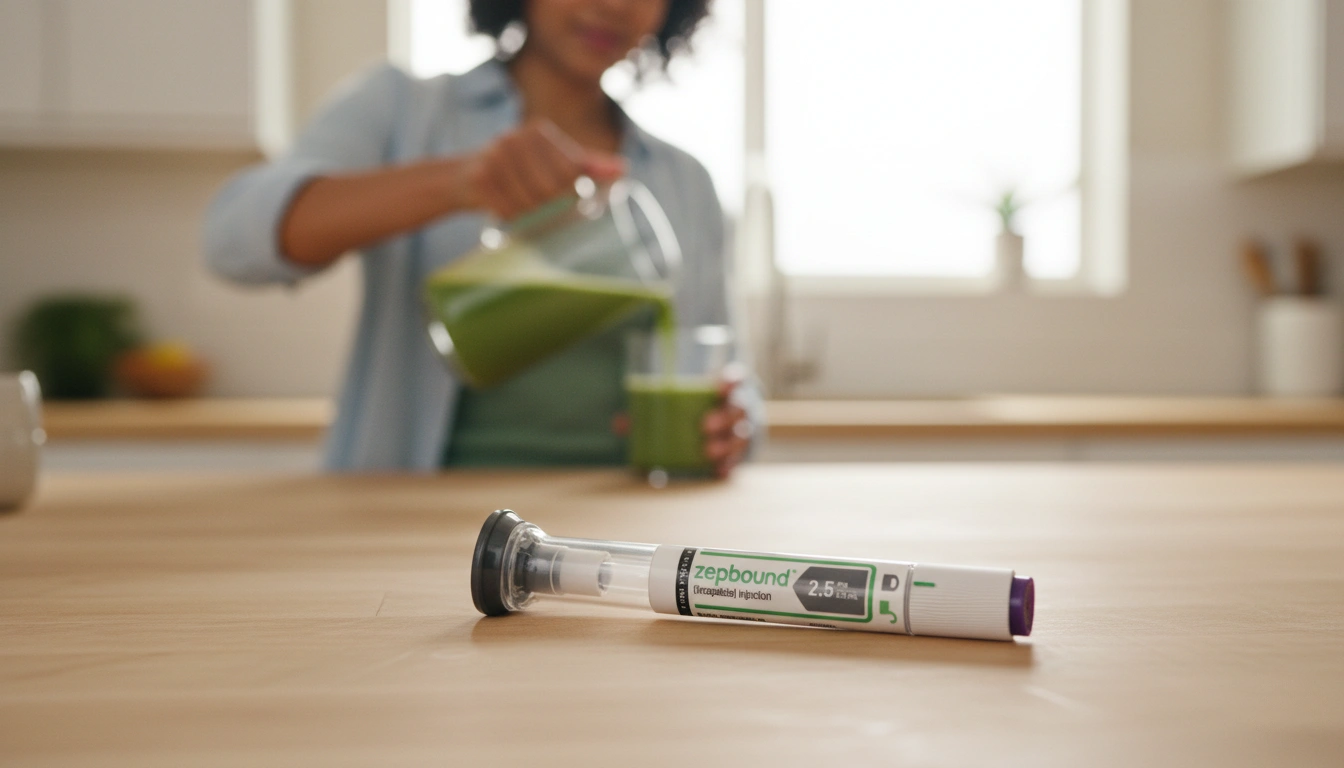How Long Does It Take to Digest Food on Zepbound?

In recent years, the rise of weight loss medications like Zepbound has transformed how many individuals approach their weight management journey. Zepbound, which contains the active ingredient tirzepatide, is known for its ability to reduce appetite and promote weight loss by mimicking hormones that regulate hunger and digestion. But as with any medication, understanding its effects on the body—especially concerning digestion—is crucial for anyone considering or currently using it.
Have you ever wondered how long it takes for food to digest while on Zepbound? This question is particularly important as the medication works by slowing gastric emptying, which can influence how quickly food moves through your digestive system. In this post, we will explore the digestion process in relation to Zepbound, how it works, what to expect while using it, and how to manage any potential side effects. By the end of this article, you’ll have a clearer understanding of how Zepbound affects digestion and how to navigate your weight loss journey effectively.
Introduction
The digestive process is a complex and vital function of the human body, involving multiple organs and hormones working in tandem. When we eat, our stomach begins to break down food, and this process typically takes a few hours. However, various factors can influence digestion, including diet, lifestyle, and, notably, medications like Zepbound.
Zepbound is categorized as a GLP-1 receptor agonist. This class of medications has been developed to help manage weight and improve metabolic health. Zepbound works by mimicking the action of GLP-1, a hormone that slows down digestion and promotes feelings of fullness. This mechanism can lead to significant weight loss for many individuals but also raises important questions about its impact on digestive health and the timing of food digestion.
In this blog post, we will delve into:
- How Zepbound affects digestion and gastric emptying.
- The typical duration for food to digest while on Zepbound.
- Common side effects related to digestion and how to manage them.
- Dietary considerations to optimize your experience on Zepbound.
By understanding these aspects, we can better navigate our weight loss journeys while ensuring our digestive health remains a priority.
Understanding Digestive Processes
To comprehend how Zepbound affects digestion, we must first understand the basic processes involved in digestion. When food enters the stomach, it is mixed with gastric juices, which help break it down into a semi-liquid form called chyme. This process can take anywhere from 2 to 6 hours, depending on the type of food consumed.
After the stomach, the chyme gradually moves into the small intestine, where the majority of nutrient absorption occurs. The entire digestion process, from consumption to elimination, typically spans 24 to 72 hours. However, various factors—including the composition of meals and medication—can influence this timeline.
The Role of Hormones in Digestion
Hormones play a vital role in regulating digestion. When we consume food, the body releases several hormones, including:
- Gastrin: Stimulates the secretion of gastric juices.
- Ghrelin: Increases appetite.
- Cholecystokinin (CCK): Promotes the release of digestive enzymes and bile, aiding in fat digestion.
- Glucagon-like peptide-1 (GLP-1): Slows gastric emptying and promotes satiety.
When medications like Zepbound are introduced, they mimic the action of GLP-1, leading to a prolonged feeling of fullness and slower gastric emptying. This alteration is beneficial for individuals looking to manage their appetite and reduce overall caloric intake.
How Zepbound Affects Gastric Emptying
Zepbound is specifically designed to slow down how quickly food leaves the stomach. This can lead to sustained feelings of fullness, which is one of the primary mechanisms behind its weight loss effectiveness. However, this action also means that the digestion process is extended.
Typical Gastric Emptying Times on Zepbound
Research indicates that, under normal circumstances, the stomach empties within 2 to 4 hours after a meal. However, studies suggest that when individuals are on GLP-1 receptor agonists like Zepbound, gastric emptying can be significantly delayed.
- Initial Stages (First Month): During the initial weeks of treatment, it might take over an hour longer for food to leave the stomach compared to individuals not on the medication.
- Subsequent Stages (After Four Months): Over time, as the body adapts to the medication, gastric emptying times can stabilize, but it may still take about 30 minutes longer than normal.
This means that while you may feel full for a longer period after eating, the actual time it takes for food to digest can range from 3 to 5 hours or longer, depending on individual factors such as meal composition and overall health.
Side Effects Related to Digestion
As with any medication, Zepbound can lead to side effects, particularly gastrointestinal (GI) symptoms. Some common digestive-related side effects include:
- Nausea: Often occurs when starting the medication or increasing dosages.
- Vomiting: Can happen if food is not digested properly.
- Diarrhea or Constipation: Due to slowed gastric emptying, some may experience constipation, while others might suffer from diarrhea depending on their diet and hydration.
- Stomach Pain or Discomfort: Some individuals may experience discomfort due to prolonged digestion.
While these side effects can be concerning, they are often temporary and may subside as the body adjusts to the medication.
How to Manage Digestive Side Effects
- Start with a Low Dose: If you’re newly prescribed Zepbound, your healthcare provider will likely start you on a lower dose to help your body adjust.
- Eat Smaller Meals: Consuming smaller, more frequent meals can help minimize feelings of fullness and discomfort.
- Stay Hydrated: Drinking plenty of water can aid digestion and help alleviate constipation.
- Monitor Your Diet: Pay attention to how different foods affect your digestion. High-fat foods may exacerbate nausea, while fiber-rich foods can help with constipation.
Dietary Considerations While Using Zepbound
A well-balanced diet is essential for anyone using Zepbound. Although the medication helps manage appetite and slows digestion, the types of food we eat can significantly influence our overall experience.
Foods to Focus On
- High-Fiber Foods: Fruits, vegetables, whole grains, and legumes can help ensure regular bowel movements.
- Lean Proteins: Foods like chicken, turkey, fish, and plant-based proteins can help you feel full without excessive calories.
- Healthy Fats: Incorporate sources of healthy fats like avocados, nuts, and olive oil, but be mindful of portion sizes as they can be calorie-dense.
Foods to Limit
- High-Fat Foods: Foods rich in saturated fats can slow digestion and lead to discomfort.
- Sugary Foods: High sugar intake can lead to rapid spikes and drops in blood sugar, affecting overall energy levels and hunger.
- Processed Foods: These often contain additives that can irritate the digestive system.
By paying attention to your diet and how it interacts with Zepbound, you can enhance your weight loss journey while maintaining digestive health.
Conclusion
Understanding how long it takes to digest food on Zepbound is crucial for anyone utilizing this medication in their weight management efforts. While Zepbound effectively slows gastric emptying and promotes feelings of fullness, it also extends digestion times, which can lead to various gastrointestinal side effects. By adopting dietary strategies and maintaining open communication with healthcare providers, we can optimize our experiences on Zepbound and navigate our weight loss journeys more effectively.
As we continue to explore the intersection of medication, diet, and overall health, we encourage you to consider how your choices impact your body. If you're looking to start your journey with Zepbound or want to learn more about maintaining a healthy diet while on this medication, feel free to take our free assessment quiz to see if you qualify for personalized weight loss solutions with TrimRx.
FAQ
Q: How long does it typically take for food to digest while on Zepbound?
A: Gastric emptying can take longer on Zepbound, often ranging from 3 to 5 hours or more, depending on individual factors and meal composition.
Q: What are common side effects associated with Zepbound?
A: Common side effects include nausea, vomiting, diarrhea, constipation, and stomach pain. These may occur as your body adjusts to the medication.
Q: How can I manage digestive side effects while using Zepbound?
A: Start with a lower dose, eat smaller meals, stay hydrated, and monitor your diet to manage side effects effectively.
Q: Are there specific foods I should avoid while on Zepbound?
A: It’s advisable to limit high-fat and sugary foods, as they can exacerbate digestive issues. Focus on high-fiber, lean protein, and healthy fats instead.
Q: Should I consult my healthcare provider about my diet while on Zepbound?
A: Yes, maintaining open communication with your healthcare provider about your diet and any side effects you experience is essential for optimizing your treatment.
By engaging thoughtfully with our health and wellness journeys, we can achieve the sustainable weight loss we strive for, all while prioritizing our overall well-being.

Transforming Lives, One Step at a Time
Keep reading
Navigating Your Path: How Many Doses Are In Zepbound and What It Means for Your Health Journey
Curious how many doses are in Zepbound? Discover its weekly dosing schedule, available strengths, and titration process for effective weight loss. Learn more!
Navigating Your Zepbound Journey: Understanding Dosing and Expert Guidance
Wondering how to split doses of Zepbound? Learn why it’s unsafe & not recommended. Get expert guidance on Zepbound dosing for safe, effective weight loss with TrimRx. Click to learn more!
Understanding Zepbound Dosing: What is the Lowest Dose Available for Your Weight Loss Journey?
Curious what is the lowest dose of Zepbound available? Learn about Zepbound’s 2.5mg starting dose, titration, and safe use for weight loss. Get expert guidance!



